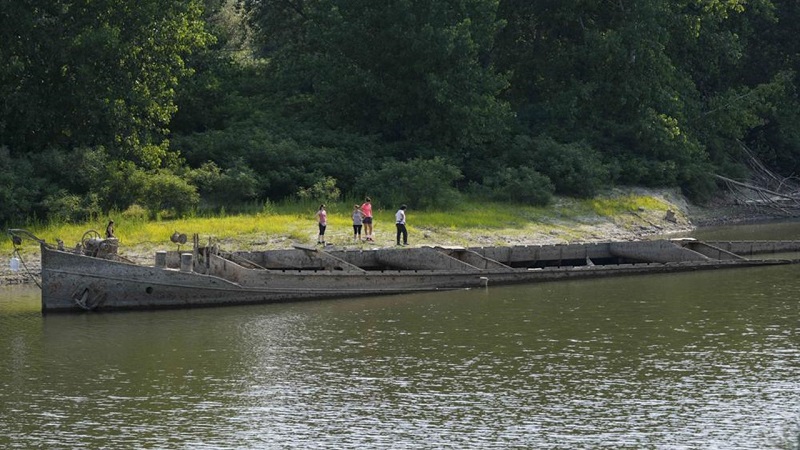Northern Italy, deprived of significant rainfall for months has dried up the 400-mile (650km) Po River, which stretches from the Alps in the north-west and flows through the Po delta.
The worst drought to affect Italy’s longest river in 70 years has led authorities urging more than 100 towns in the Po valley to ration water.
The issue has been aggravated by higher-than-usual temperatures and much less snow in the winter, especially in the southern Alps, which contributed to lower snowmelt flowing into the Po.
Italy is experiencing a protracted heatwave, with temperatures in some areas of the Po valley forecast to hit 36C by the end of the week.
The river’s depth currently measures up to 2.7 metres below the zero gauge, well below the average for June.

A man walks near a bridge in Boretto, Italy, on the bed of the Po river-AP
The situation, which is severely impacting agricultural activities as well as commercial shipping, has prompted Utilitalia, a federation of water companies, to ask for the nightly suspension of drinking water supplies in 125 towns, 100 in the Piedmont region and 25 in Bergamo province in Lombardy, in order to restore reservoir levels.
The Po also flows through Emilia-Romagna and Veneto, serving one of the most important agricultural zones in Europe.
In a park near the central northern village of Gualtieri, cyclists and hikers observed the Zibello, a 50-meter long (164 feet) barge that transported wood during the second world war but sank in 1943. It is normally covered by the Po’s waters.

“It’s the first time that we can see this barge,” said amateur cyclist Raffaele Vezzali as he got off the pedals to stare at the rusted ship. Vezzali was only partially surprised, though, as he knew that the lack of winter rain caused the river to reach record low levels.
But the curiosities of a resurfaced wartime boat and wide sandy beaches do little to mask the disruption this will cause for local residents and farmers.
Meuccio Berselli, secretary general of the Po River Basin Authority, is frantically working on a resiliency plan to guarantee drinking and irrigation water to millions of households and to the Po valley farmers, who produce 40% of Italian food. Parmesan cheese, wheat, and high-quality tomatoes, rice and renowned grapes grow in huge quantities in the area.
The Italian farmers confederation estimates that wheat yields could drop by 20% to 40% this year. Wheat is a particular concern for farmers as it’s completely reliant on rain and does not get irrigated.
The water shortage won’t just hamper food production, but energy generation, too. If the Po dries up, numerous hydroelectric power plants will be brought to a halt, at a time where the war in Ukraine has already hiked up energy prices across Europe.
According to a state-owned energy service system operator, 55% of the renewable energy coming from hydroelectric plants in Italy comes from the Po and its tributaries. Experts fear that a lack of hydroelectric power will contribute to increased carbon dioxide emissions, as more electricity will have to be produced with natural gas.
-Guardian/AP